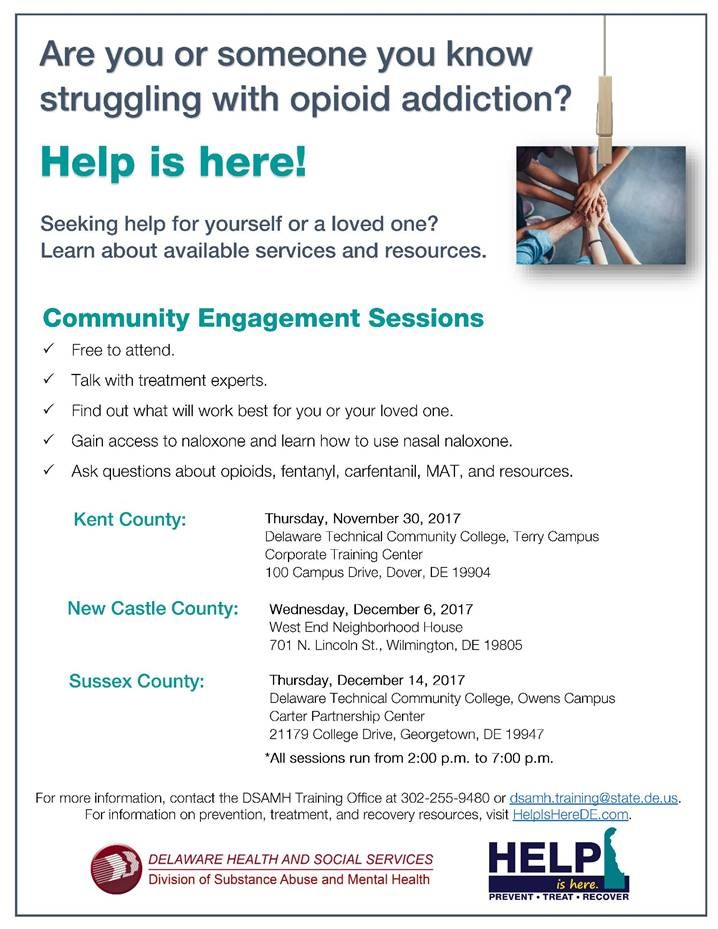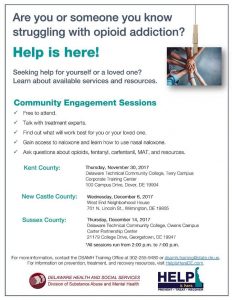Free DHSS Community Sessions on Addiction Treatment Services and Supports Available in Delaware
Delaware Health and Social Services | Governor John Carney | Office of the Governor | Date Posted: Tuesday, November 21, 2017
Delaware Health and Social Services | Governor John Carney | Office of the Governor | Date Posted: Tuesday, November 21, 2017

NEW CASTLE (Nov. 21, 2017) – Dozens of community partners will participate in a series of free addiction-related community sessions hosted by the Delaware Division of Substance Abuse and Mental Health (DSAMH) as a way for people to talk with treatment experts, learn about local services and supports, and have access to a training class on how to use the overdose-reversing medication naloxone.
“We’ve heard from people across our state who say they aren’t always sure where and how to access treatment for their loved ones suffering from addiction,” Gov. John Carney said. “These sessions will give people the opportunity to talk face-to-face with providers and advocates from their communities, to ask questions and to figure out which options are best for their particular needs.”
All community sessions are from 2-7 p.m. The schedule:
Department of Health and Social Services (DHSS) Secretary Dr. Kara Odom Walker, a board-certified family physician, said the sessions also will give people in the community the opportunity to learn more about naloxone, the medication that can reverse opioid overdoses.
“It’s important for us to meet people where they are, and in this case, it’s in their communities,” Secretary Walker said. “By offering community naloxone training classes at these sessions, we can increase access to this life-saving medication. Saving a life from an overdose is our first priority, and from there, we can encourage people in active use to seek treatment as their next step toward recovery from this disease.”

A Division of Substance Abuse and Mental Health trainer will lead the naloxone training sessions at each event.
In July, Governor Carney signed legislation providing for increased access to naloxone at pharmacies in Delaware. DHSS’ Division of Public Health (DPH) announced earlier this month that people now can buy naloxone at all 20 CVS Pharmacy locations statewide after they are educated on the appropriate use of the medication and sign an acknowledgment form.
In 2016, naloxone was administered 2,334 times by paramedics, police and other first responders to 1,535 individuals. In the first half of this year, the antidote was administered to 866 people in Delaware. Under Delaware’s 911/Good Samaritan Law, people who call 9-1-1 to report an overdose and the person in medical distress cannot be arrested for low-level drug crimes.
Dr. Clarence Watson, acting director of the Division of Substance Abuse and Mental Health, said the community engagement sessions are a good way to help families understand how to access addiction treatment for their loved ones. “We thought it was critical to have these sessions in each county as a way to personalize the connection to treatment,” he said.
Dr. Watson urged individuals in active substance use to see a medical provider immediately or call DHSS’ 24/7 Crisis Services Hotline to be connected to trained crisis professionals who can discuss treatment options. In Kent and Sussex counties, the number is 1-800-345-6785. In New Castle County, the number is 1-800-652-2929. Individuals and families also can visit DHSS’ website, www.HelpIsHereDE.com, for addiction treatment and recovery services in Delaware and nearby states.
In 2016, 308 people died in Delaware from overdoses, up 35 percent from the 228 people who died in 2015.
For more information about the community engagement sessions, contact the Division of Substance Abuse and Mental Health Training Office at 302-255-9480 or email dsamh.training@delaware.gov
-30-
The Department of Health and Social Services is committed to improving the quality of life of Delaware’s citizens by promoting health and well-being, fostering self-sufficiency, and protecting vulnerable populations.
Related Topics: Addiction, community, DSAMH, recovery, substance use, treatment
Keep up to date by receiving a daily digest email, around noon, of current news release posts from state agencies on news.delaware.gov.
Here you can subscribe to future news updates.
Delaware Health and Social Services | Governor John Carney | Office of the Governor | Date Posted: Tuesday, November 21, 2017

NEW CASTLE (Nov. 21, 2017) – Dozens of community partners will participate in a series of free addiction-related community sessions hosted by the Delaware Division of Substance Abuse and Mental Health (DSAMH) as a way for people to talk with treatment experts, learn about local services and supports, and have access to a training class on how to use the overdose-reversing medication naloxone.
“We’ve heard from people across our state who say they aren’t always sure where and how to access treatment for their loved ones suffering from addiction,” Gov. John Carney said. “These sessions will give people the opportunity to talk face-to-face with providers and advocates from their communities, to ask questions and to figure out which options are best for their particular needs.”
All community sessions are from 2-7 p.m. The schedule:
Department of Health and Social Services (DHSS) Secretary Dr. Kara Odom Walker, a board-certified family physician, said the sessions also will give people in the community the opportunity to learn more about naloxone, the medication that can reverse opioid overdoses.
“It’s important for us to meet people where they are, and in this case, it’s in their communities,” Secretary Walker said. “By offering community naloxone training classes at these sessions, we can increase access to this life-saving medication. Saving a life from an overdose is our first priority, and from there, we can encourage people in active use to seek treatment as their next step toward recovery from this disease.”

A Division of Substance Abuse and Mental Health trainer will lead the naloxone training sessions at each event.
In July, Governor Carney signed legislation providing for increased access to naloxone at pharmacies in Delaware. DHSS’ Division of Public Health (DPH) announced earlier this month that people now can buy naloxone at all 20 CVS Pharmacy locations statewide after they are educated on the appropriate use of the medication and sign an acknowledgment form.
In 2016, naloxone was administered 2,334 times by paramedics, police and other first responders to 1,535 individuals. In the first half of this year, the antidote was administered to 866 people in Delaware. Under Delaware’s 911/Good Samaritan Law, people who call 9-1-1 to report an overdose and the person in medical distress cannot be arrested for low-level drug crimes.
Dr. Clarence Watson, acting director of the Division of Substance Abuse and Mental Health, said the community engagement sessions are a good way to help families understand how to access addiction treatment for their loved ones. “We thought it was critical to have these sessions in each county as a way to personalize the connection to treatment,” he said.
Dr. Watson urged individuals in active substance use to see a medical provider immediately or call DHSS’ 24/7 Crisis Services Hotline to be connected to trained crisis professionals who can discuss treatment options. In Kent and Sussex counties, the number is 1-800-345-6785. In New Castle County, the number is 1-800-652-2929. Individuals and families also can visit DHSS’ website, www.HelpIsHereDE.com, for addiction treatment and recovery services in Delaware and nearby states.
In 2016, 308 people died in Delaware from overdoses, up 35 percent from the 228 people who died in 2015.
For more information about the community engagement sessions, contact the Division of Substance Abuse and Mental Health Training Office at 302-255-9480 or email dsamh.training@delaware.gov
-30-
The Department of Health and Social Services is committed to improving the quality of life of Delaware’s citizens by promoting health and well-being, fostering self-sufficiency, and protecting vulnerable populations.
Related Topics: Addiction, community, DSAMH, recovery, substance use, treatment
Keep up to date by receiving a daily digest email, around noon, of current news release posts from state agencies on news.delaware.gov.
Here you can subscribe to future news updates.